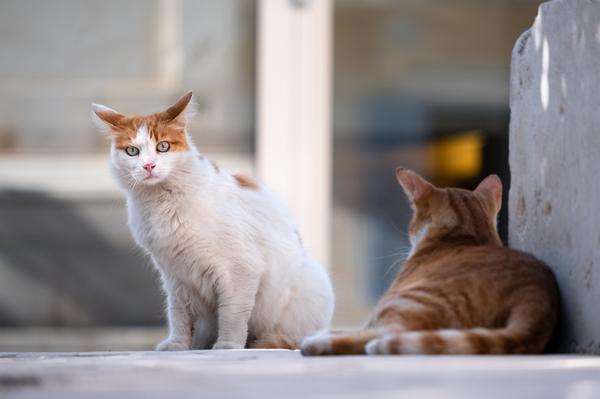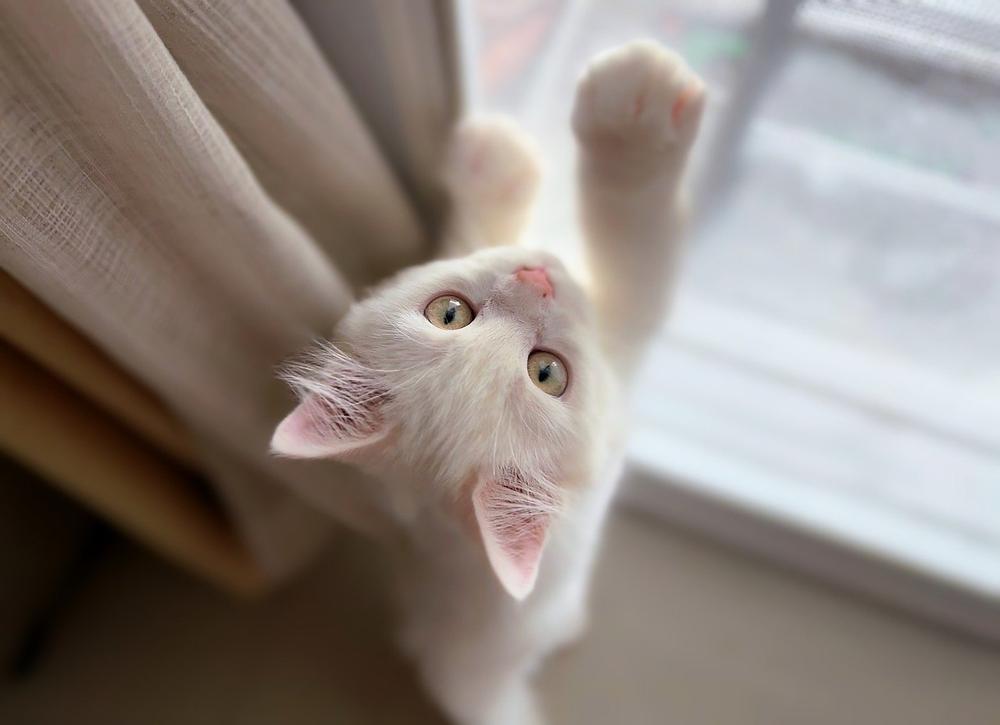Can Cats Eat Grapes?

You'll agree with me when I say:
Worrying about the safety of our furry friends can be gut-wrenching. 😟
Picture this – the worst-case scenario:
Your innocent cat munching on something that could harm them.
But listen, I'm here to put your mind at ease.
Let's dive in and get the answers you need.
Can Cats Eat Fruits like Grapes, Raisins, and so On?
Here's what you need to know about grapes and raisins to keep your cat healthy:
- Raisins can be more toxic than fresh grapes because they are dried.
- Cats, as obligate carnivores, aren't really into sugary fruits or carbs like grapes.
- Kittens should only have their mother's milk as cats struggle with digesting lactose.
- For optimal health, make sure your cat's diet includes vitamin A, taurine, arachidonic acid, and protein.
- Taurine is super important for a cat's heart health, vision, and dental well-being. 😺
- Even though some cats might enjoy the texture, it's best to avoid giving grapes because they could be toxic.
- Consuming large amounts of raisins can also be harmful to cats.
- To play it safe, just don't let your cat eat any grapes or raisins at all.
- And hey, stay away from anything grape-related like juice, bread, cookies, protein bars, or homemade stuff.
Cats are famously choosy eaters, but when it comes to their safety, you gotta keep harmful foods out of their reach.
And finally, if you're wondering about other fruits that are safe for your cat to eat, I highly recommend checking out my article on Can Cats Eat Strawberry.

It's always important to ensure that your furry friend's diet is healthy and suitable for their needs.
This article will provide you with more information on feeding cats strawberries and answer any concerns you may have.
So, feel free to dive in and discover the truth about cats and strawberries!
Signs of Grape Poisoning in Cats
Signs of grape poisoning in your cat are critical to watch out for.
Keep a close eye on your furry friend for restlessness, reduced appetite, and vomiting.
Grape toxicity in cats is not common, but it can lead to serious health complications.

Around 15% of cats may show signs of toxicity when they eat grapes or raisins.
These symptoms can worsen and include lethargy, weakness, diarrhea, abdominal discomfort, excessive thirst and urination, foul-smelling breath, and even neurological problems like seizures and coma.
In severe cases, grape toxicity can cause renal failure.
Dogs may experience similar symptoms if they consume grapes or raisins, including vomiting, diarrhea, lethargy, loss of appetite, increased thirst, stomach pain, weakness, dehydration, and tremors.
The Dangers of Grapes for Cats: A Single Grape's Impact
Grapes might seem innocent, but they're actually really dangerous for cats:
- Just a little bit of grape nibbling can mess up your cat's kidneys beyond repair.
- After eating grapes, cats may throw up or feel tired, lose their appetite, or have tummyaches.
- Scientists aren't sure what exactly in grapes harms cats, but there's some kind of water-soluble stuff in the grape flesh that does bad things to them.
- Even though cats don't need grapes or fruits like dogs do, they can still get sick from them.
- We don't even know how many grapes or raisins could poison a cat, so it's best not to give them any at all.
- All types of grapes and raisins are toxic for pets, so make sure your cat can't eat them.
- Onions, garlic, shallots, and scallions can hurt cats too by messing with their blood cells and making them anemic.
- Same goes for chocolate, especially darker chocolate, which can cause vomiting, diarrhea, or even seizures in cats.
To ensure the well-being and safety of your cat, it is important to exercise caution and possess knowledge regarding these hazards.

But that's not all you need to be aware of when it comes to grape consumption in cats... I must caution you about the immediate actions you should take if your cat does eat grapes, as well as other potential dangers lurking in your home...
Treating Food Poisoning and Grape Consumption in Cats
If your cat gets into some grapes, here's what you need to do:
- Act fast and don't waste any time.
- Get in touch with a vet or an emergency clinic right away for their expert advice.
- Make sure grapes and raisins are always out of reach for your cat.
- It's crucial to let your vet know about any grape munching incidents.
- Keep an eye out for other potential dangers like raw eggs or meat.
- Those can give your cat salmonella or E. coli poisoning.
- Look for signs such as vomiting, diarrhea, and tiredness in your feline friend.
- You should also be aware that alcoholic drinks and alcohol-containing foods are unsafe for cats.
- Alcohol can make cats vomit, get diarrhea, shake, feel lost, and have trouble breathing.
- The worst cases could result in a coma or even death.
- If your cat eats grapes or raisins, they need immediate veterinary care.
- Don't wait around, contact your vet or Animal Poison Control straight away, especially if your cat has eaten a lot of grapes. Cats who've had grapes or thrown up/had diarrhea within twelve hours might need IV fluids as part of their treatment.
And it gets worse.
Veterinary treatment for grape toxicity is essential, involving decontamination and monitoring of the cat's kidneys.
But what happens if you can't get immediate veterinary attention?
Read on to discover some emergency measures you can take at home...
How Vets Treat Grape Toxicity in Cats
Veterinary Treatment for Grape Toxicity
When it comes to treating grape poisoning in cats, vets have a specific plan to ensure your furry friend gets the care they need. First off, don't induce vomiting unless specifically directed by a vet.
Instead, focus on cleaning out the cat's stomach with procedures like gastric lavage.
This helps get rid of any remaining grapes or raisins.
Next, they'll give intravenous fluids to wash out the bloodstream and help the kidneys. Throughout treatment, regular blood work is done to keep track of how things are going.
Hospitalization and Medication
Depending on how serious the situation is, your little buddy may stay at the hospital for a day or two.
This way, they can receive continuous IV fluids and be closely monitored.
In some cases, cats might need to stay longer or take additional medication. The treatment is personalized based on each cat's symptoms and in essence health.
And here's an important thing to remember: there isn't a known antidote for grape poisoning.
So supportive therapies are very important.
Vets will adjust the treatment to deal with specific symptoms and any complications that come up.
Immediate Action and Pet Insurance
Time is super important...
If your cat eats grapes or any other toxic foods, you need to get them to a vet right away.
Treatments usually involve inducing vomiting to get rid of any remaining grapes, giving activated charcoal to bind the toxins, and providing IV fluids in a controlled setting.
Just in case these unexpected expenses pop up, it's smart to think about getting pet insurance. It can help cover the cost of vet treatments and give you peace of mind.
So take precautions and keep your furry friend safe!
Ending notes
Key Takeaways:
- Cats are obligate carnivores and generally have no interest in fruits like grapes.
- Cats need a diet rich in vitamin A, taurine, arachidonic acid, and protein.
- Grapes and raisins should be avoided due to potential toxicity.
- Symptoms of grape toxicity in cats include vomiting, reduced appetite, and neurological signs.
- Even a small amount of grape ingestion can lead to irreversible kidney damage in cats.
- Cats should not consume onions, garlic, shallots, scallions, or chocolate.
- If your cat consumes grapes, immediately call a veterinarian for advice.
- Raw eggs, raw meat, and alcoholic beverages are also dangerous for cats.
- Immediate veterinary treatment is necessary if a cat ingests grapes.
- Do not induce vomiting unless recommended by a veterinarian.
And that wraps up today's article.
Just before you leave, may I just ask: Did my blog post prove useful for you? If it did, I would be incredibly grateful if you could share it with your friends and family. A quick click on any of the social media sharing icons will allow you to instantly spread the word. Thank you so much!
Talk soon,
-Sarah Davis